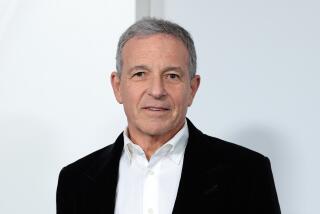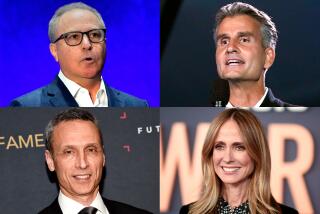Eisner: Ovitz Failed to Adapt
- Share via
GEORGETOWN, Del. — Walt Disney Co. Chief Executive Michael Eisner today testified that Michael Ovitz “started to rub people the wrong way” shortly after arriving as company president, portraying him as an “elitist” who once opted to ride in a limousine during a theme park tour in lieu of a bus with other executives.
Eisner testified that Ovitz failed to adapt to being part of an executive team, clashed with peers and ultimately could not accept serving as second in command. A watershed moment, Eisner testified, came when Ovitz took the limousine during the Walt Disney World tour.
“He was in a non-Hollywood environment acting a little special,” Eisner said.
Eisner’s comments came during his second day of testimony in a shareholder lawsuit in Delaware Chancery Court alleging that he and other Disney directors mishandled the 1995 hiring of Ovitz and Ovitz’s firing 15 months later. Ovitz collected a stock-and-severance package that plaintiffs lawyers value at more than $140 million. They are seeking to recoup $200 million in payments and interests.
Eisner was careful to temper his criticisms, in line with a defense strategy that seeks to show that, while Ovitz failed in the job, he did nothing so egregious to give Disney legal grounds to deny him his severance.
Eisner described Ovitz as an intelligent executive who took on too much. Ovitz, Eisner said, joined Disney with extraordinary expectations from Creative Artists Agency, where he was Hollywood’s top agent and widely regarded as the most powerful figure in the business.
“Everyone was expecting him to hit it out of the park every time he came to the plate,” Eisner said, “and it wasn’t even the same park. It was very tough on him. I had sympathy for him, and still do.”
Eisner also countered allegations that Disney’s board rubber-stamped Ovitz’s hiring.
He said he called each board member individually on the weekend before Ovitz’s hiring was announced, reading to the courtroom from his phone logs. He said he also made it clear to Ovitz that the hiring was subject to approval both by Disney’s board and its compensation committee.
Eisner also disputed an account given by Sid Bass, Disney’s former top shareholder, in a deposition in which Bass said Eisner had doubts about Ovitz as little as five weeks after the hiring.
“That conversation didn’t happen,” Eisner testified. Instead, Eisner said, his doubts about Ovitz surfaced in spring, 1996, when he told an inner circle of board members that “the honeymoon was over.”
Eisner also described how Ovitz repeatedly clashed with several top executives, including former chief financial officer Stephen Bollenbach, former top lawyer Sanford Litvack, and Robert Iger, then ABC’s chief and now president of Disney.
Litvack, Eisner testified, told him that “he didn’t believe he could stay at the company if Michael Ovitz continued,” Eisner said. “I just told him ‘Relax.’ Then, Bob Iger had a similar problem.”
Eisner countered Ovitz’s testimony that portrayed Eisner as failing to teach him how to be an executive at a public company. Eisner said he shared memos and e-mails with Ovitz, and took him on trips to Japan and Europe to help him learn Disney’s global operations.
“I included him in everything I did,” Eisner testified. “I figured that was his best education.”
Eisner said “some of my worst fears got accentuated” as time passed. One complaint was that Ovitz often dealt personally with his former clients even though they had relationships at Disney.
Eisner also said that Ovitz never made good on his pledge to build Hollywood Records, one of his chief tasks, and eventually lost focus of his job.
“He wanted to make a big deal, make a big mark, and I wanted him to focus on the operations,” Eisner said.
In the end, Eisner said, Ovitz was too uncomfortable having a boss.
“I think he was in a cage, and that was frustrating to him,” Eisner said.
More to Read
The biggest entertainment stories
Get our big stories about Hollywood, film, television, music, arts, culture and more right in your inbox as soon as they publish.
You may occasionally receive promotional content from the Los Angeles Times.











